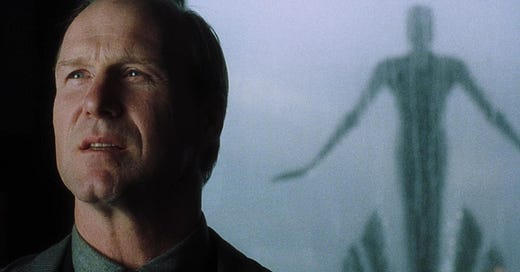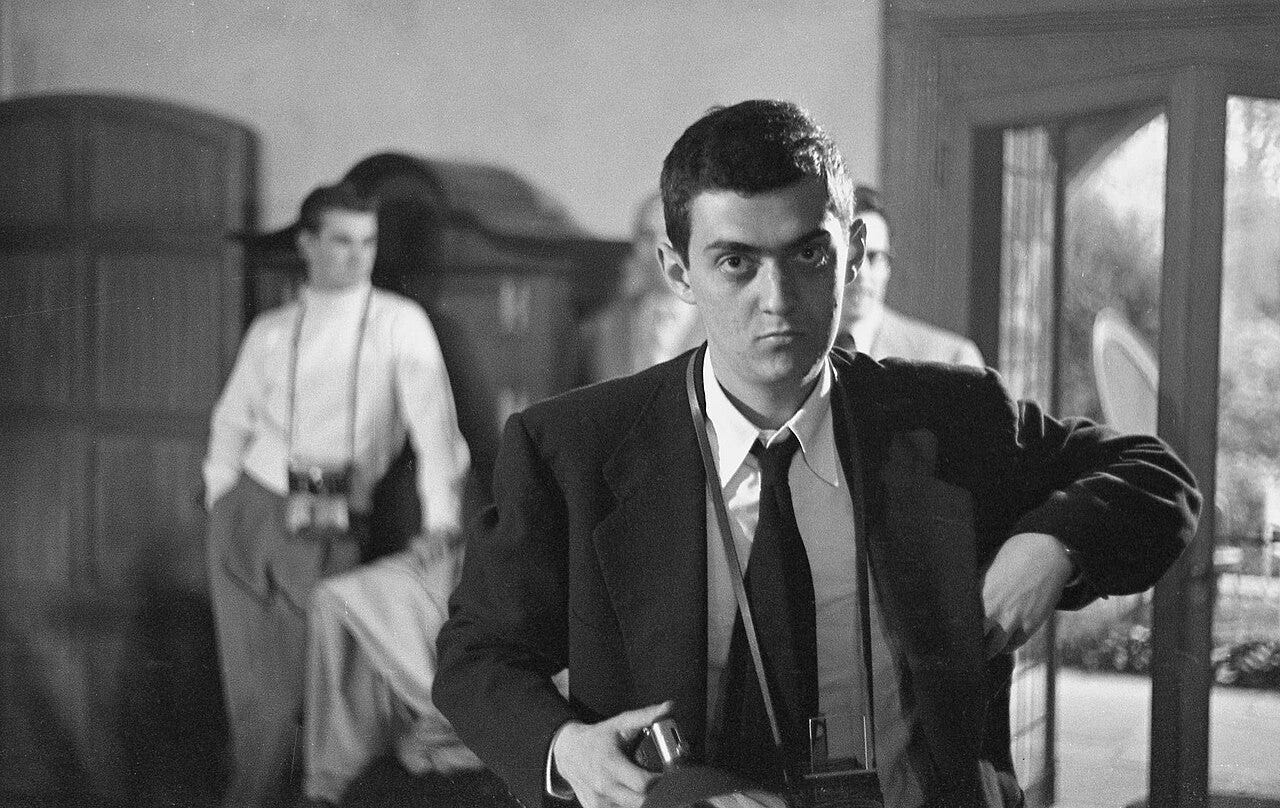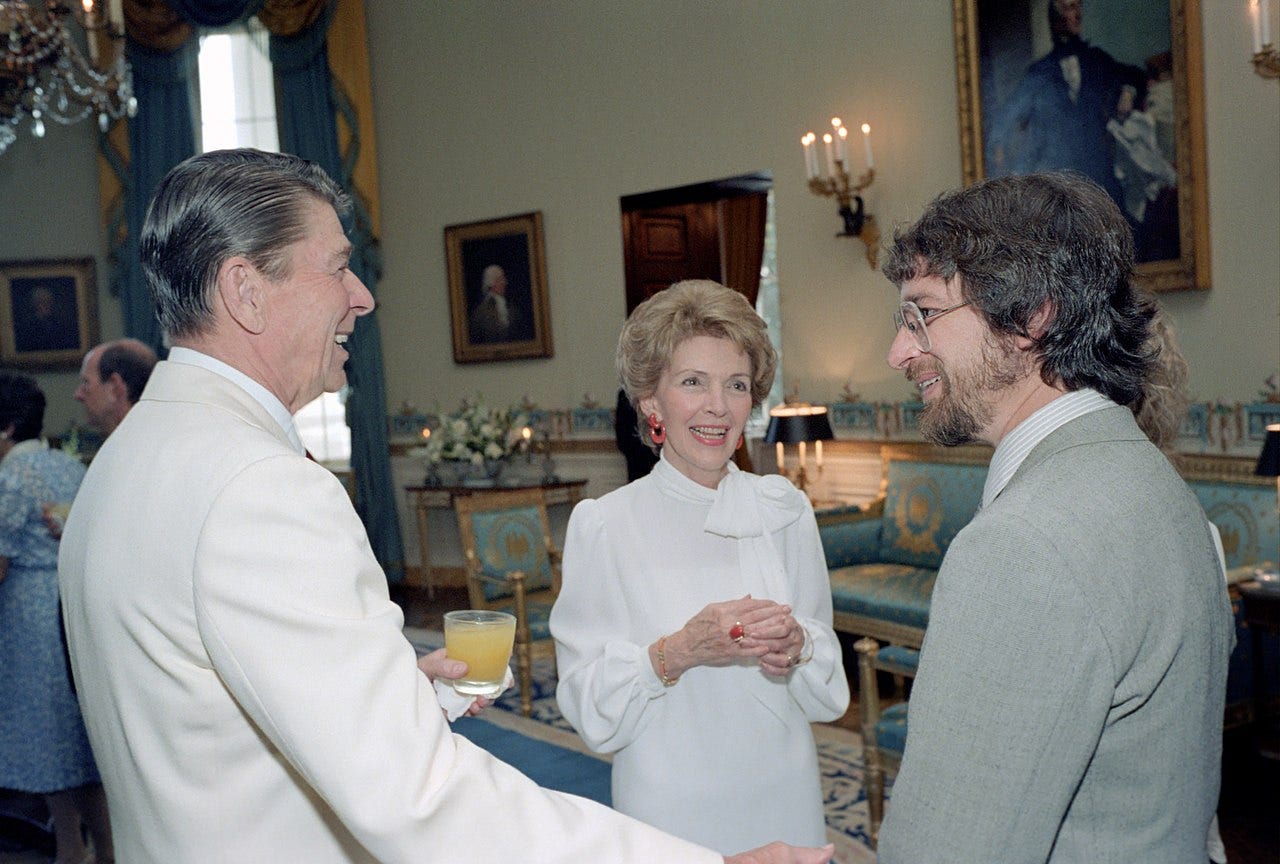In a way, you might consider this the third Stanley Kubrick essay. Number one is here, and number two here.
Why did God create man? And were we made in His image, as we’re told in Genesis, or sculpted from dust as we’re also told only a few lines later? Was man a mirror, or sui generis?
Was man created so that God might be loved – so that His Glory might be reflected in His creations? And if that love was to be expressed by the reverent obedience of minds untouched by their knowledge of Good and Evil, then of what value is that love if it has been effectively programmed by Him? What possible satisfaction can God find in a love that has not been chosen and independently developed, but effectively coerced by His subjects’ innocence?
*
In Steven Spielberg’s A.I. Artificial Intelligence (2001), a film set in a grim future, a married couple mourn the loss of their young son, Marty. Or at least they ambivalently mourn him: stricken by a rare disease, he lies in cryogenic suspension, with no guarantee of revival, and so his parents’ mourning is suspended too.
Meanwhile, a darkly obsessive designer of sentient androids – himself grieving the loss of his only child – creates a new prototype, the most hyper-realistic yet, and one uniquely capable of “love”. In Professor Hobby we have a slight advancement upon Dr Frankenstein: a man whose brilliant sacrilege is born from hubris and suffering.
This new, experimental model comes into the custody of Monica and Henry Swinton, and by the simple observance of a few protocols – the pressing of a button and the reading of several seemingly arbitrary words – the boy’s “love” is programmed. Once done, it cannot be undone – David’s devotion will only end with his (or its) destruction.
Monica hesitates only briefly about adopting David, desperate as she is to reclaim the love of a child. If God created man from an extravagant surplus of love, then David’s adoption follows its absence – the need to fill a terrible void.
It’s hard to judge too severely Monica’s desire, but her need for synthetic love, however skilful its simulation, creates something terribly perverse: David’s love will long outlast its subject – he is effectively immortal – and as the creature of a factory, and not Monica’s womb, his love can never enjoy symmetry. He is smart enough – or his programming sophisticated enough – to be aware of his devotion, and to enact its rituals, but not sophisticated enough to know why he can’t be loved in return.
And then: young Marty is resurrected and returns home.
*
Spielberg’s A.I. was itself an act of devotion and resurrection. The film’s concept had once been the intellectual property of Stanley Kubrick who had, on-and-off for decades, devoted himself to its making. The idea first came, as many did for Kubrick, from literature: the 1969 short-story “Super-Toys Last All Summer Long” by the British sci-fi writer Brian Aldiss.
Just a few years later, Kubrick purchased the story’s film rights, and began writing his own liberally expanded outline. Over many years, he employed – then brusquely dumped – countless writers to improve upon it.
Kubrick was probably a genius and most certainly a prick, and every writer he employed experienced a variation of the following: profound flattery; weeks or months of Kubrick’s contradictory and boundary-less demands; and then, finally, their swift, cold dismissal that always came with a request to destroy all the work they’d done for him.
One of the many writers employed by Kubrick for this project was Ian Watson, and his long Playboy essay about the experience of working as a “mind-slave” is a remarkably funny and candid insight into being employed by a brilliant but intolerable lunatic.
Watson describes working from Kubrick’s mansion, Childwickbury Manor, Hertfordshire, in the early ’90s – a place so stupendously large that he barely becomes accustomed to the maze of its ground floor, much less the others. But he’s familiar enough to say that “its labyrinthine grottos included a mini-movie theatre where Stanley could study the latest screen releases in darkness and privacy” and a “large sepulchral computer room where two cats who never saw the light of day glided like wraiths”.
The manor is so large, and Kubrick’s willingness to schlep across it so small, that Watson received his master’s incessant queries by walkie-talkie. Then, in the evening, the two would retire to Kubrick’s study with containers of Chinese takeaway and discuss the day’s work.
Watson called these conversations “mental gymnastics” and one had to be agile – and patient – to serve as a foil to Kubrick’s excitably fickle talk. “Even ordinary conversations with Stanley were a bit disconcerting since he would suddenly shift to an entirely different topic, as if he had forgotten or lost interest in what was of consuming interest a moment earlier,” Watson wrote. “When we were discussing the story line itself, these veerings became not merely ninety-degrees but three-dimensional – we weren’t just into lateral thinking; this was Escher mind-space.
“Eventually I decided that Stanley’s intention, whether deliberate or purely instinctive, was to maintain mental intensity hour after hour, never mind how exhausting this might prove – a way of sustaining and heightening my performance, and his own too perhaps, which has left people who worked with him feeling drained dry.”
Eventually, Watson’s employment would go the same way as those who preceded him, including the author of the original short story as well as Arthur C. Clarke, the independently distinguished man who had written Kubrick’s masterpiece 2001: A Space Odyssey.
“When you’re invaluable to Stanley, it’s difficult to escape or to have a life,” Watson wrote. But when you weren’t, then nothing could protect a writer from being dismissed from his table like some clumsy waiter. Except, perhaps, the self-absorbed prevarications of a genius: Watson was never officially dismissed, just kind of forgotten about. After months of daily faxes and phone calls, each one urgently asserting an instruction that contradicted yesterday’s, the Great Man went quiet. He was now filming Eyes Wide Shut, and then he was editing it, and then he was dead.
Watson considered his time with Kubrick as a frustrating but thrillingly surreal episode, a chanced glance at a spectacularly unusual man. “Looking back, I feel a great affection for Stanley – or am I as bemused as the little lost robot boy about what is real and what is not?” he wrote. “Stanley did tend to use people and drain them in the process, and this could ruffle egos after the initial flush of excitement. As a supreme and obsessive auteur, why shouldn’t he? ... Various egos did not like being treated as so many plumbers. Still, everyone had kept mum until Stanley died because there was always the hope of more money.”
For all the years and all the writers and all the mysterious fluctuations of the Great Man’s focus on the project, one thread seemed to run through it all: Kubrick’s determination that the film be Pinocchio with robots. It was Steven Spielberg – specifically 1993’s Jurassic Park – that convinced Kubrick that his vision might indeed, visually at least, be achieved.
In time, the two would talk. Often, and for hours. And when Kubrick died suddenly, of a bad heart in ’99, Spielberg would take custody of the long and strangely belaboured Pinocchio project.
*
Young Marty returns home and unhappily finds a rival to his mother’s attentions. And so, with the inventive malice available to most from a young age, he plots to undermine his robotic sibling.
David might be an android, but his programming is sophisticated enough for him to succumb to self-destructive jealousy. It’s an advanced artificial intelligence that might simulate the reactive stupidity of youth, and he’s a ripe mark for the manipulations of his rival.
By chance or design, David will behave in ways that Marty knows will be interpreted by his parents as proof that their experimental robot child is volatile and dangerous. And so it is. David must be returned to its sender and melted down.
Except that Monica, who can neither keep David nor condemn him to the scrap heap, settles upon a compromise: she’ll dump him in the forest, along with his talking teddy bear, and tearfully wish him the best.
It’s an agonising scene: David pleads with all the terrified incredulity of an actual boy, and our sympathy is helped by the fact that he’s played by a real boy – Hayley Joel Osment.
And only from here, 45 minutes into this strange film, does the picaresque “Pinocchio” begin – the sweet urchin’s quest to become a “real boy” and thus made eligible for his mother’s love.
*
Before Kubrick’s death, he’d already suggested that Spielberg direct the film. If film snobs thought the pair’s respective sensibilities were incompatible, Kubrick thought otherwise. Then his sudden death transformed, for Spielberg, a curious prospect into a sacred imperative.
In possession of Kubrick’s drawings and the latest, 90-page treatment, Spielberg shut himself away for a few weeks and wrote the script himself. A.I. would be one of only three films that Spielberg would both write and direct.
The different sections of the film resemble separate dreams, and the first, which shows a more-or-less recognisable, if uncanny, Spielbergian suburbia gives way to something more closely resembling the comic grotesques of Jean-Pierre Jeunet. The film’s final section, in its extravagant narrative leap, resembles Kubrick’s “Stargate sequence” in 2001: A Space Odyssey – not visually, but in its metaphysical ambition.
A.I. is an exotic melange, and one of Spielberg’s darkest films. After a recent viewing, I was surprised at how well it insinuated itself into my mind – colouring my moods and sponsoring brief reveries. And all this while never being quite sure if the film was any good.
*
Where God had once instructed His first children to “be fruitful and multiply and fill the earth”, in A.I. earthly powers have all but prohibited procreation – one can only legally have children by virtue of winning a lottery.
In the Old Testament, God’s call to fertility was followed by an encouragement for man to assume “dominion over the fish of the sea, and over the fowl of the air, and over the cattle, and over all the earth”. But in A.I., man has enjoyed its dominion too much, and an earth now eerily transfigured by climate change – all coastal cities have been eradicated by rising oceans – has compelled the severe and unnatural curbing of child-bearing in order to better preserve our resources.
And so, by necessity it seems, the world is now heavily populated by androids (or “Mecha”). Beyond their resource-heavy creation, a narrator tells us, they are low-maintenance: they require no food, water, clothing. Some calculus of efficiency has been found and globally assented to, and a slave-class of androids now service the variety of human needs.
But if cities can be erased, our desire for children can’t be.
*
It’s curious now to reflect upon a film called A.I. in which its maker intends our sympathies to lie with the machines. Today, almost a quarter century since the film’s release, A.I.’s capacity to automate labour has inspired fear and loathing. Musicians from Ice Cube to Nick Cave rage and warn of the technology’s application – whether its accelerating of soullessness or its easy counterfeiting of intellectual property.
But in A.I. it’s those warning about the diminishment of human dignity who are cast as villains. In the film’s universe, bounty hunters search for decommissioned Mechas, ones who have escaped their destruction and wander in a shadowy underworld. Once captured, they’re submitted to the Flesh Fair – a popular carnival where humans can drink beer and cheer the creative destruction of the Mecha.
But when David is paraded as the next victim, the crowd is suddenly disquieted by his lifelike appearance and atypical resistance to his destruction – he’s simply too lifelike, and the crowd noisily petition for his release. The carnival’s ringmaster tells them: “Don’t be fooled by the artistry of this creation”. And:
“Ladies and gentleman, boys and girls and children of all ages. What will they think of next? See here. A bitty-bot, tinker toy, a living doll. Of course, we all know why they made them. To steal your hearts, to replace your children. This is the latest generation in a series of insults to human dignity... and in their grand scheme to phase out all of God's little children. Meet the next generation of child designed to do just that.”
In A.I., these are the words of a villain, a carnival barker who hosts spectacles of violence. Today, though, we might find his words familiar and, in other contexts, sympathetic. In 2023, Nick Cave responded on his Red Hand Files site to a fan’s question on what he thought of ChatGPT writing song lyrics “in the style of Nick Cave”:
“What ChatGPT is, in this instance, is replication as travesty. ChatGPT may be able to write a speech or an essay or a sermon or an obituary but it cannot create a genuine song. It could perhaps in time create a song that is, on the surface, indistinguishable from an original, but it will always be a replication, a kind of burlesque.
“Songs arise out of suffering, by which I mean they are predicated upon the complex, internal human struggle of creation and, well, as far as I know, algorithms don’t feel. Data doesn’t suffer. ChatGPT has no inner being, it has been nowhere, it has endured nothing, it has not had the audacity to reach beyond its limitations, and hence it doesn’t have the capacity for a shared transcendent experience, as it has no limitations from which to transcend.”
In contrast, electronic artist Grimes (who now goes by “c” – as in the symbol for the speed of light) had described how she’d learnt to stop worrying about A.I. and to love the singularity. “I think A.I. is great,” she told The New York Times in 2020. “… creatively, I think A.I. can replace humans. And so I think at some point, we will want to, as a species, have a discussion about how involved A.I. will be in art.”
In most of Grimes’ pronouncements about art, I sniff the vapours of a very particular type of pretension – the person who believes themselves open-minded, avant-garde, and courageous about the future, and demonstrates these virtues through a conspicuously radical faith in technology.
I always get the feeling with Grimes that she’s desperate to tell us how far-seeing she is – a prophetic sprite, encouraging us to slip the surly bonds of humanity. “I feel like we’re in the end of art, human art,” she said in a 2019 episode of the Mindcast podcast. “Once there’s actually A.G.I. [Artificial General Intelligence], they’re gonna be so much better at making art than us.”
In A.I., Professor Hobby – our Dr. Frankenstein or Geppetto – says that “Ours will be a perfect child caught in a freeze frame. . . Our little Mecha will not only open up a compelling market, it will fill a great human need.”
But it won’t. It can’t.






